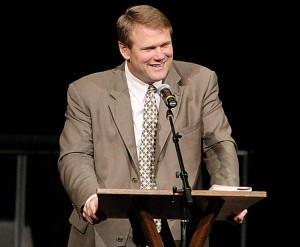Westmont Magazine How Faith and Prayer Benefit the Brain
by Gayle D. Beebe, Ph.D., President
Evagrius, a great saint of the fourth century, aspired to honor God and give his life to great purposes. In the last issue, I talked about the eight deadly thoughts he identified that limit our life with God. I find it fascinating that recent discoveries about the human brain have confirmed some of his intuitions about the destructive effect of anger and other negative emotions.
“How God Changes Our Brain: Breakthrough Findings from a Leading Neuroscientist” isn’t an explicitly Christian book. One of the authors, Dr. Andrew Newberg, says, “Many of you are wondering, do I believe in God? I’m not even sure God exists. My associate, Mark [Mark Robert Waldman], doesn’t believe God exists at all. I’m not sure. But what we can prove to you is that believing that God exists is fundamentally good for you as a human being.”
Newberg identified several things he discovered about the effect of religious contemplation on the human brain. First, engaging in 12 minutes of personal reflection and prayer each day makes a profound impact on our brain. It strengthens a unique neural circuit that specifically enhances our social awareness and empathy and helps us love our neighbor by developing a heightened sense of compassion and subduing negative emotions. What is one of the most destructive feelings? Anger. What does anger do? It isolates us from other people. It cuts us off. It destroys community as we retract within ourselves.
The second is neuroplasticity: Our brain isn’t fixed like a plastic mold, it’s nimble. Scientists once thought our brain grows and develops for several years and then reaches a point where it begins to decay and slowly erode. But we now know that brains continue to develop as a result of the experiences and behaviors we engage in every day. For example, Newberg says we can have memories that continue to take on new forms simply by the way we repeat them to ourselves. They actually become independent of the things we’re remembering.
Third, because our brain will constantly change, we need to be mindful of whether we’re developing in good or destructive ways. The disciplines we engage every day, every week, every year, fundamentally shape the destiny of our life, and we need to be aware of the extent to which our behavior affects our brain.
The fourth is that prayer and personal reflection help us maintain a healthy balance in life. I believe every one of us needs to spend a small portion of each day in personal prayer and reflection. I need it. You need it. No matter how busy we are, we’ve got to make space so we know our priorities and our values and can assess how well we’re living up to them. We need to ask ourselves daily, “What adjustments do I need to make to develop my life with God?”
Newberg describes eight things we can do to positively shape our brains. He begins with the value of maintaining personal religious faith and adds spending time each day in prayer and personal reflection. Also important is talking to others and being part of a community. Aerobic exercise helps our brain develop as well. So does yawning, which Newberg says focuses our attention. Another activity is listening to 12 minutes of relaxing music every day. Staying intellectually active and becoming a lifelong learner also benefit the brain. Finally, he says smiling builds community. People who smile attract others; those who frown or show anger push people away.
It’s interesting to bring Newberg’s book together with Evagrius and his treatment of anger. Noting that anger pulls communities apart, Evagrius called it the most feared passion, a boiling wrath against those we think have harmed us.
We all struggle at one time or another with this emotion, which Newberg describes as the most primal and difficult to control. Anger interrupts the functioning of our frontal lobes and causes us to lose the capacity for compassion and empathy. It also releases a cascade of neurochemicals that destroy the parts of the brain that control emotional reactions. In other words, anger causes us to lose our capacity to self-regulate, to make a measured response regardless of the stimulus. Interestingly, Evagrius identified mildness, or the capacity for self-restraint, as the godly virtue that corresponds with the deadly thought of anger.
When we intently and consistently focus on our spiritual values, we increase the blood flow to our frontal lobes and to our anterior cingulate, which causes the activity in the emotional centers of our brain to decrease. That helps us develop the capacity to make responses that maintain and even restore community. But conscious intention is the key. The more we focus on our inner values, the more we can take charge of our life.
So I invite you to join me in reflecting on Scripture and spending time in prayer each day as we continue to develop our life with God and shape our future in profound ways.
